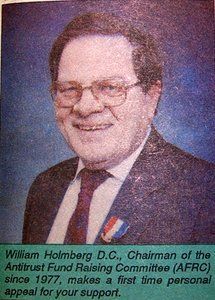It’s a new year and many chiropractors are evaluating what will enhance their respective practices, particularly as it relates to their bottom line. One of the most common questions I get is: “Do I need to be credentialed to bill insurance, and what are the best plans to join?” It’s a loaded question – but one every DC ponders. Whether you're already in-network or pondering whether to join, here's what you need to know.
Funding the Last Phase of the Wilk et al. v. AMA Suit
When the Supreme Court denied the AMA's request for review of Wilk et al. in November 1990, many in chiropractic assumed the battle was finally over. This landmark antitrust case is in its 15th year. Phase one is over; phase two is just beginning.
When Wilk et al. v. AMA goes back to the United States District Court (Northern District of Illinois) there will be two significant matters of litigation: the amount of reparations the AMA must pay to recover the legal costs of the plaintiff chiropractors; and a statement of cooperation with chiropractic that the AMA must draft.
The United States District Court in 1987 stated that the AMA must pay "reasonable" fees and expenses. The parties appear to be many millions of dollars apart on what is "reasonable," and we can be assured the AMA will vigorously contest this issue. The money from this settlement will be dedicated to Kentuckiana and to research
projects at chiropractic colleges.
The AMA is obligated by the suit to write and adopt a "statement of interprofessional relations with doctors of chiropractic," which must be sent to all AMA members; the AMA must further insert new provisions into its ethical code. The language adopted by the AMA for these documents must be negotiated, and most likely will be contested in court.

Chiropractic would like to see the AMA write a statement along the lines of the 1985 position paper of the Illinois State Medical Society, (the AMA's fourth largest group) which says in part:
There are and should be no ethical or collective impediments to full professional association and cooperation between doctors of chiropractic and medical physicians ... this includes referrals, consultations, group practice in partnerships, HMOs, PPOs, and other alternative health care delivery systems; the provision of treatment privileges and diagnostic services (including radiological and other laboratory facilities) in or through hospital facilities; working with and cooperating with doctors of chiropractic in hospital settings ... association and cooperation in hospital training programs for students in chiropractic colleges ... participation in student exchange programs between chiropractic and medical colleges; cooperation in research programs and the publication of research material in appropriate journals; participation in health care seminars, continuing education programs, and any other (cooperation) designed to foster better health care for patients of medical physicians, doctors of chiropractic, or both.
Such a statement is unlikely to be adopted by the AMA without long, drawn out legal maneuverings.
It would be a travesty of justice to abandon the "Chicago Four" plaintiffs (Drs. Wilk, Pedigo, Arthur, and Bryden) at this critical juncture of the lawsuit; and to allow the AMA a token compliance of the court's order of injunction, due to a lack of financial resources necessary to pursue the case to its justified conclusion.
Legal costs are both a necessary and expensive part of this battle. The chiropractic profession has been generous in its contributions to the suit over the past 15 years. The AMA has spent millions trying to escape defeat; many more chiropractic dollars are critical to insure that they don't. Please continue to support our efforts in court against the AMA by filling out the accompanying pledge card and mailing it to me.
William Holmberg, D.C.
Rock Island, Illinois




